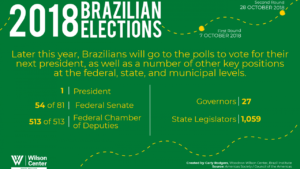
Wilson Center
The first round of the Brazilian presidential and general elections “hit traditional forces like a tsunami and set the country on a new and uncertain path,” writes the Wilson Center’s Brazil Institute Director Paulo Sotero. And with the untested, ultraconservative Jair Bolsonaro expected to win the runoff, “it remains to be seen if he will be able to effectively govern a divided country.”
More than an organised right-wing movement, Brazilian presidential candidate Bolsonaro commands an authoritarian current of opinion. He may be more intent on dynasty than dictatorship, The Economist reports:

Wilson Center
Rather than a flashback to 1964, Mr Bolsonaro represents a more insidious threat. He expresses extreme views. He has said that the dictatorship erred in “torturing rather than killing”. He wants the police to kill more “criminals”, and to liberalise gun ownership. He has talked about packing the supreme court. As Mr Spektor puts it, it is the quality of Brazilian democracy, rather than its survival, that is at more immediate risk.
Yet none of this means that Mr Bolsonaro, assuming he wins, would or could attempt to replicate the dictatorship, The Economist adds:
His rise reflects widespread hatred of the PT and a popular demand for change, economic renewal and security in the face of a failing political system, economic slump and a crime wave—but not necessarily for military rule.
“This is not the cold war,” says Matias Spektor, who teaches international relations at the Fundação Getulio Vargas, a university. The media and a vibrant civil society support democracy.
Visit the WWICS 2018 Brazilian Election Portal >>>







